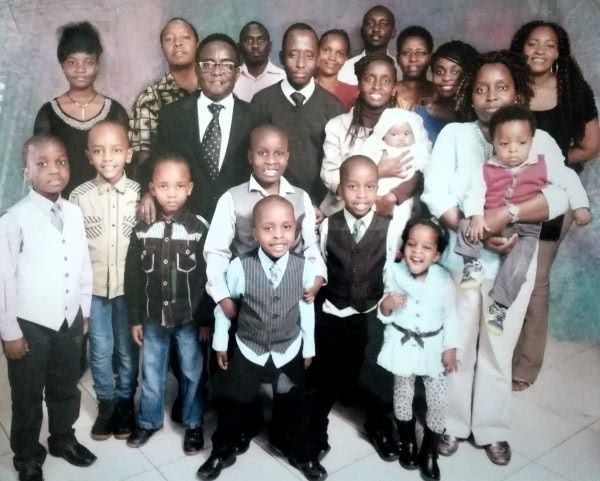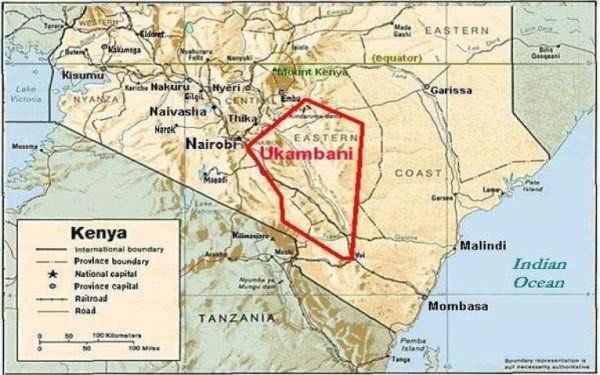I was born in a little village in Ukambani. This part of Kenya is quite poor as it is very dry. Most people live from what they get from their farms, but given the climate most years we do not get big harvests. This area is also famous for wood carvings that some of the locals make and then normally sell to visitors and tourists in Nairobi, Mombasa or Nanyuki.
Anyway, it was in this place that I attended primary school. I then had to go elsewhere for my secondary education as the village did not have a high school. From there I went to College, got a job, got married, had children...
Because of my family roots are in that village, I continued travelling back there from time to time and began to do a bit of farming in the family land. This became a lot easier when I started working in Nairobi as I could travel to my village in less than three hours. So, on average, I tried to be there one weekend a month.
In 2010, to my surprise, I was informed that I had been appointed the chair of the church management committee for this particular outstation, called St. Pius Catholic Church, Kaitha! Let me explain. Our church is one of twenty outstations (churches) that depend on the parish church. Only one priest worked in that parish church in 2010 and currently in 2018 we have two. As you can imagine we only saw the priest once a month on a Sunday in 2010, currently we manage to see him twice a month, if we are lucky. The other Sundays we have a liturgical function conducted by the catechist. She basically does the readings of the Mass, explains some point of Christian doctrine and the service ends without any Communion since the Church does not permit reserving the Blessed Eucharist in outstations.
Anyway, given that I was only a visitor to the village once a month, I did not feel I was the best person for that position. So next time I saw the priest I told him that I was thinking of not accepting the appointment. The priest encouraged me to be generous with my time but left me free to decide. After praying about it I decided to give it a shot.
As I began to think about my new role, I saw that the faith of the people was very weak and they lacked enthusiasm. Something had to be done to revive the embers of that faith. So I began to pray and to think what we could do and where to begin.

The church building and furniture was very dilapidated. Possibly it had been built 40 years before and since then nothing much had been done to that building. I told the people that we had to improve the house of God. We could not be happy attending church in a place that was much worse than any of our houses. So we started collecting money from the Christians and making small improvements: repairing the seats, putting tiles on the floor, buying a good crucifix and the stations of the cross, making a new altar, putting up a confessional box, and so on. People began to see the changes and were happy.
Once the building had improved a bit, we decided we needed to buy some books for the catechist, prayer books for children, bibles for the small Christian communities and even liturgical books for our ceremonies. Little by little, as the money trickled in, we got them.
I had also noticed that the children of the area were not attending church. So we began to remind parents that they had to bring their children to church and not to send them to look after goats and cattle on Sunday. Otherwise how would the children receive the faith?
We also reflected on the importance of the catechist in such a community where the priest is absent for long periods of time. So we made several collections from the faithful and we sent our catechist for a one year training in a Catholic College, so that she will learn more about the faith herself and then be able to pass it to the rest of us. At the beginning, there was some opposition to such a move, since it was expensive, but now with hindsight we as a church can say that this was one of the best decisions we ever made. Once the catechist returned to the village, we noticed a great improvement in her work: leading the Sunday prayers, leading funeral services, preparing children and adults for baptism and so on.
We also realized that the practice of the sacraments was minimal. There had been no baptisms in five years, no weddings, only about five people went to Communion on a given Sunday, there hardly were confessions, etc. It was obvious we had to change that.
In 2011, with the effort of all, we had a mass wedding where 15 couples got married, including my son. So we began to get rid of the backlog. In most of the cases men were the hindrance. So we got into a campaign to talk to the men. We realised that they had only needed someone to invite them to the sacrament. We also began to ask the priest to sit down in the confessional at least for an hour before mass, whenever he came. And people began to go to confession, and to receive Communion.
Now after these years of work, of talking to individuals and explaining the faith to them we have about 50 children and 20 adults baptized every year, we have between 50 and 100 people receiving Holy Communion every Sunday, we have about 5 weddings on average every year. The young people also attend church and they feel part of it. The church is now vibrant with the youth. If the collection plate is also a reflection of a revived faith, then we can say that our faith is very vibrant, as our collections have also increased dramatically.
Our dream is to have our own parish church, with our resident priest, so that we can have Mass more frequently, perhaps even daily. We would also love to get some priestly vocations coming from the village, so that they can take good care of us and also we can contribute to spread the Gospel elsewhere. Another dream we had was to have a secondary school in the village, a dream that is already a reality, but that is a story for another day.
I give thanks to God for what we have achieved, which I think is in great part due to the formation I have received in Opus Dei. It has helped me appreciate my faith much more deeply and therefore I can help others to do the same. In a short while I may be retiring from my job in Nairobi, and then I may be able to spend more time in my village. As I see what we have achieved in the last eight years, I dream with what lays ahead of us. What before was impossible, now is possible, if we rely on God and on his grace!
Daniel
